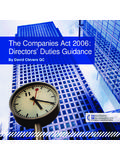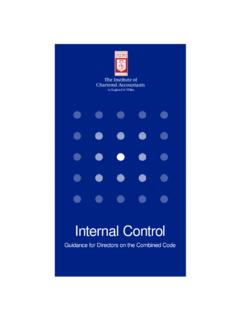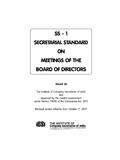Transcription of The Principal Duties and Powers of Company …
1 The Principal Duties and Powers ofCompany Directorsunder the Companies ActInformation Book 2 Company DirectorsThe Principal Duties and Powers ofCompany Directorsunder the Companies ActCopyright and Disclaimer StatementThe contents of this document are the copyright of the Director of Corporate Enforcement. All or part of this publication may be reproduced without further permission, provided the source is herein should be construed as a representation by, or on behalf of, the Director of Corporate Enforcement as to his understanding or interpretation of any of the provisions of the Companies Act 2014 or as to the interpretation of any legal advice should be sought in relation to the effects of any legal provision. The Director of Corporate Enforcement accepts no responsibility or liability howsoever arising from the contents of this publication or any errors, inaccuracies or omissions in the contents of this document.
2 The Director reserves the right to take action, which may or may not be in accordance with the provisions of this document. Director of Corporate Enforcement 20152 Office of the Director of Corporate Enforcement Information Book 2 The Principal Duties and Powers of Company Introduction Principal Duties and Powers of Company Directors 6 What is a Company Director 6 Qualifications Required to Become a Company Director 6 Types of Company Director 7 Shadow Directors 7 De Facto Directors 7 Alternate Directors 7 Managing Directors 7 Executive Directors 8 Non-Executive Directors 8 What are Company Directors Duties and Obligations 8 Directors Fiduciary Duties 8 Directors Statutory Duties 10 Duties as a Company Officer 10 Duty to Keep Adequate Accounting Records 10 Duty to Prepare Financial Statements (Annual Accounts) 11 What does True and Fair View Mean 13 Obligation to have Statutory Financial Statements Audited 13 Duty to Maintain Certain Registers and Other Documents 13 Duty to File Certain Documents with the Registrar of Companies 14 Duty of Disclosure 15 Duty to Convene General Meetings of the Company 15 Annual General Meeting (AGM) 15 Extraordinary General Meetings (EGM)
3 16 Substantial Non-Cash Transactions Involving Directors 16 Loans to Directors and Connected Persons 17 Personal Liability 17 Offence 17 Duties of Directors of Companies in Liquidation and Directors of Insolvent Companies 18 Duties of Directors of Insolvent Companies 18 Duties of Directors of Companies in Voluntary Winding-Up 18 Members Voluntary Winding-Up 18 creditors Voluntary Winding-Up 19 Company Directors Powers 193 Office of the Director of Corporate Enforcement Information Book 2 The Principal Duties and Powers of Company Penalties Under the Companies Act 20 Penalties for Criminal Offences 20 Court Imposed Penalties 20 Civil Penalties 21 Disqualification 21 Automatic Disqualification 21 Disqualification Undertaking 22 Restriction 22 Restriction Undertaking 22 Strike Off 23 Appendix A Appointment and Removal of Company Directors and Related Matters 24 Appointment of Directors 24 Removal of Directors 24 Remuneration of Directors 24 Requirement to have One Director Resident in the European Economic Area (EEA)
4 25 Limitation on the Number of Directorships 25 Appendix B Restriction and Disqualification of Company Directors 26 Introduction 26 Restriction of Directors 26 Restriction Undertaking 26 Personal Liability 27 Disapplication of Certain Provisions to a Company with a Restricted Person 27 Relief from Restriction 27 Person will not be Restricted 27 Offence of Contravening a Restriction Order 27 Disqualification of Directors 27 Offence of Contravening Disqualification Order 28 Automatic Disqualification 28 Discretionary Disqualification Orders 28 Disqualification Undertaking 29 Relief from Disqualification 29 Civil Consequences of Acting while Restricted or Disqualified 29 Registers of Restricted and Disqualified Persons 294 Office of the Director of Corporate Enforcement Information Book 2 The Principal Duties and Powers of Company IntroductionThe Companies Act 2014 brought about some of the most significant changes in Company law in fifty years.
5 It created new forms of Company , and introduced a number of changes to the roles of various parties in Company Office of the Director of Corporate Enforcement (ODCE) in furtherance of its remit to encourage compliance with Company law, has historically issued a range of Information Books outlining the main roles and responsibilities of some of the key parties in Company law, to assist non-professionals who aspire to be better informed about their rights and obligations under the Information Books were first issued in November 2001, and the current edition represents the third major rewrite of these publications since their first publication. The current edition reflects the law as at the passing of the Companies Act 2014. The books are on the following topics:Information Book 1 CompaniesInformation Book 2 Company DirectorsInformation Book 3 Company SecretariesInformation Book 4 Members and ShareholdersInformation Book 5 AuditorsInformation Book 6 CreditorsInformation Book 7 Liquidators, Receivers and ExaminersIn addition to information on the relevant Duties and Powers , each book also contains information on the penalties for failure to comply with the Companies book has been prepared for use by a non-professional audience in order to make the main requirements of Company law more easily Director of Corporate Enforcement considers it important that individuals who take the benefits and privileges of incorporation should be aware of the corresponding Duties and responsibilities.
6 These Information Books are designed to increase the awareness of individuals in relation to those Duties and Director wishes to make clear that this guidance cannot be construed as a definitive legal interpretation of the relevant provisions. Moreover, it must be acknowledged that the law is open to different interpretations. Accordingly, readers should be aware that there are uncertainties in how the Courts will interpret the law, particularly when the law is applied to the specific circumstances of specific companies and is important to note that when readers have a doubt as to their legal obligations or rights, they should seek independent professional legal or accountancy advice as changes are made to Company law in the future, the Director intends to keep this guidance up to date. He also welcomes comment on its content, so that future editions can remain as informative as of the Director of Corporate Enforcement May 20155 Office of the Director of Corporate Enforcement Information Book 2 The Principal Duties and Powers of Company Principal Duties and Powers of Company What is a Company DirectorA Company director is a person appointed, usually by the members of a Company , to manage the Company on their behalf.
7 The term director has no specific meaning but is defined under Section 2(1) of the Companies Act, as follows: director includes any person occupying the position of director by whatever name called . Accordingly, a director is recognised not merely by his or her title but principally by his or her function, which depends on the nature of the primary function of the directors is to manage1 the business of the Company on behalf of the internal rules on corporate governance and the Duties of officers of the Company are now codified in the Companies Act under Part 4 and Part 5. This means that a Company need not have extensive Articles in the constitution. However, if the Company adopts the standard articles without any exclusions or modifications to the optional provisions as set out in those parts, all the provisions in the standard articles, including the optional provisions apply to the Company and to its directors where main legislative provisions concerning Company directors under the Companies Act are set out under Part 4 in sections 128 to 167 and under Part 5 in sections 219 to person who plans to become a Company director should, on or before appointment, become familiar with the legal responsibilities and obligations attaching to the Qualifications Required to Become a Company DirectorA person requires no formal qualifications to become a Company director.
8 The Companies Act requires a Company to have at least one2 director. However, most companies other than an LTD3, are legally required to have at least two directors. In most instances, a director is not required to be a member (shareholder) of the Company unless the constitution requires a person can be appointed a director of a Company , the Company must ensure that such person is eligible to hold the position of director. Certain parties and persons are ineligible to hold office as a Company director, such as: a body corporate4 or an unincorporated body of persons; a person who is under the age of 18 years5; an undischarged bankrupt6; the statutory auditor of the Company ; a person disqualified from acting as a director by the Section 158 Companies Section 128 Companies A private Company limited by shares. For more information on the different types of companies, see Information Book 1 Section 130 Companies Section 131 Companies Section 132 Companies of the Director of Corporate Enforcement Information Book 2 The Principal Duties and Powers of Company DirectorsIn addition, where a person is restricted in acting as a director, the Company must comply with certain capital requirements before he or she can so act.
9 The topics of disqualification and restriction are dealt with in detail in Appendix B to this Types of Company DirectorThe following are legal categories of Company Directors7 Any person, other than a professional adviser, in accordance with whose directions or instructions the directors of a Company are accustomed to act is a shadow director . A shadow director will be treated as a director of the Company for the purposes of Part 5 of the Act8. In addition under section 231 they have additional Duties to disclose any interest in a contract s/he or a connected person has with the Company whether directly or indirectly, by writing to the directors to inform them. Many of the legal responsibilities of a director apply to shadow directors .De Facto Directors9A de facto director is a person who occupies the position of director of a Company but who has not been formally appointed or who is disqualified but who in effect occupies the position of, and acts as if he were, a director.
10 Such persons, although not formally appointed, for the purposes of section 2(1) of the Companies Act, will be treated as a director of the Directors10A director of a Company may appoint any other director of the Company as an alternate director or, with the approval of a majority of its directors, any other person as an alternate director. Any appointment as an alternate director will be effected by notice in writing given by the appointer to the Company . The appointment may be revoked at any time by the appointer or by a majority of the other directors or by the Company in general Directors11 The directors of a Company may from time to time appoint one or more of themselves to the office of managing director for such period and on such terms as to remuneration and otherwise as they see fit, and, subject to the terms of any agreement entered into in any particular case, may revoke such appointment.







